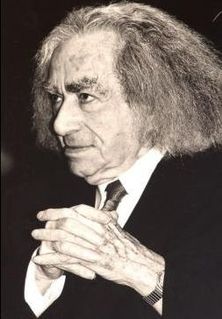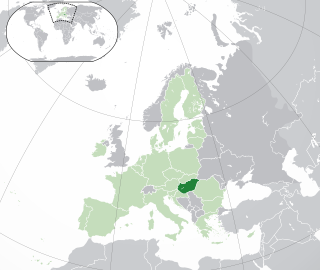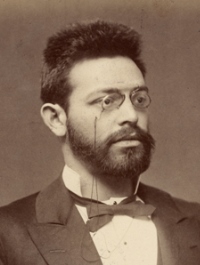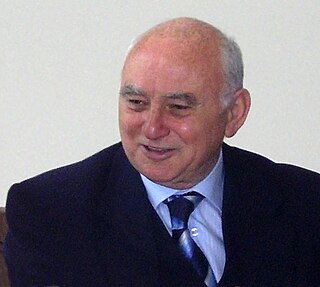
Pál Turán also known as Paul Turán, was a Hungarian mathematician who worked primarily in extremal combinatorics. He had a long collaboration with fellow Hungarian mathematician Paul Erdős, lasting 46 years and resulting in 28 joint papers.

The Arrow Cross Party was a far-right Hungarian-nationalist party led by Ferenc Szálasi, which formed a government in Hungary they named the Government of National Unity. They were in power from 15 October 1944 to 28 March 1945. During its short rule, ten to fifteen thousand civilians were murdered outright, including many Jews and Romani, and 80,000 people were deported from Hungary to concentration camps in Austria. After the war, Szálasi and other Arrow Cross leaders were tried as war criminals by Hungarian courts.

György Faludy, sometimes anglicized as George Faludy, was a Hungarian-born poet, writer and translator.

The history of the Jews in Hungary dates back to at least the Kingdom of Hungary, with some records even predating the Hungarian conquest of the Carpathian Basin in 895 CE by over 600 years. Written sources prove that Jewish communities lived in the medieval Kingdom of Hungary and it is even assumed that several sections of the heterogeneous Hungarian tribes practiced Judaism. Jewish officials served the king during the early 13th century reign of Andrew II. From the second part of the 13th century, the general religious tolerance decreased and Hungary's policies became similar to the treatment of the Jewish population in Western Europe.

Magyarization, after "Magyar"—the Hungarian autonym—was an assimilation or acculturation process by which non-Hungarian nationals living in Austro-Hungarian Transleithania adopted the Hungarian national identity and language in the period between the Compromise of 1867 and Austria-Hungary's dissolution in 1918. Magyarization occurred both voluntarily and as a result of social pressure, and was mandated in certain respects by specific government policies.

Moritz Wahrmann, Wahrmann Mór(ic) was a Hungarian politician; grandson of Israel Wahrmann. He was educated at the Protestant gymnasium and the university of his native city, and entered his father's mercantile establishment in 1847, becoming its head after his father's death.

Moriz Ludassy, aka M. Gans von Lúdassy was a Hungarian journalist.

Judah Leib "Leopold" Löw was a Hungarian rabbi, regarded as the most important figure of Neolog Judaism.

Gyula Illyés was a Hungarian poet and novelist. He was one of the so-called népi writers, named so because they aimed to show – propelled by strong sociological interest and left-wing convictions – the disadvantageous conditions of their native land.
Alexander Büchler, or Bűchler Sándor was a Hungarian rabbi and educator.

The Budapest University of Jewish Studies is a university in Budapest, Hungary. It was opened in 1877, a few decades after the first European rabbinical seminaries had been built in Padua, Metz, Paris and Breslau. Still, it remains the oldest existing institution in the world where rabbis are graduated.

Wilhelm Bacher was a Jewish Hungarian scholar, rabbi, Orientalist and linguist, born in Liptó-Szent-Miklós, Hungary to the Hebrew writer Simon Bacher. Wilhelm was himself a prolific writer, authoring or co-authoring approximately 750 works. He was a contributor to many encyclopedias, and was a major contributor to the landmark Jewish Encyclopedia throughout all its 12 volumes. Although almost all of Bacher's works were written in German or Hungarian, at the urging of Hayyim Nahman Bialik many were subsequently translated into Hebrew by Alexander Siskind Rabinovitz.

József Bánóczi was a Hungarian Jewish scholar.

Ferenc Glatz is a Hungarian historian and academician. He has served three terms as the president of the Hungarian Academy of Sciences.

Dezső Szabó was a Hungarian linguist, writer, noted mainly for his three-volume novel "Az elsodort falu" and his pamphlets. Szabó's oeuvre is contradictory, some consider it as the peak of Hungarian expressionist prose, others call it one of the first "pioneers of Magyar populist literature". He was a Nobel Prize nominee in 1935. He is also known for his anti-semitic views.

August Kanitz was a Hungarian botanist.
Pál Harkai Schiller, also known as Paul von Schiller, was a Hungarian philosopher and psychologist. In 1936, he organized the Psychological Institute at Budapest University.

Bálint Hóman was a Hungarian scholar and politician who served as Minister of Religion and Education twice: between 1932–1938 and between 1939–1942. He died in prison in 1951 for his support of the fascistic invasion of the Soviet Union and antisemitic legislation activity as part of the Axis alliance in World War II.

Bernhard Alexander (1850–1927) was a Hungarian writer of Jewish background, and a professor of philosophy and esthetics.

Bálint Magyar is a Hungarian politician, who served as Minister of Education between 1996–1998 and between 2002–2006. He was a founding member of the Alliance of Free Democrats.


















